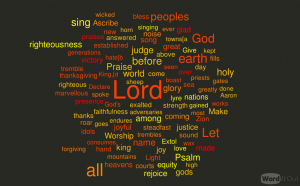If this is your first viewing, please see my Introduction before reading this, and the introduction to the Psalms for this book of the Bible in particular.
20/21 July. Psalm 119.
Psalm 119 is, famously, the longest of the 150 psalms, and an acrostic, being set in 22 sections, the verses of each section all starting with the same letter (in the original Hebrew – not obvious in most English translations).
In it, the writer or singer lists all kinds of difficulties and temptations that he faces: he feels like an alien (immigrant), people plot against him and slander him, he feels persecuted and hounded almost to death. He sees all kinds of wicked deeds being done by other people, which angers him. He is also tempted by lust, greed, and “vanities” (trivial things).
Many psalms include some or all of those elements. What is distinctive about this one is that there is a repeated refrain (with variations) on the theme of obeying God – that is, keeping what are variously described as his ordinances, statues, decrees, precepts, laws and commandments. Whatever life throws at him, whatever other people think about him, being obedient to God is the most important aspect of his life.
The “statutes” etc. are more than the obvious moral commandments of the bible – “Thou shalt not kill” and so on. The term refers to the whole body of Jewish teaching, all the ways in which people build a relationship with God, such as praying, fasting and worshipping, as well as being honest and loving in all relationships, just in trade and generous in giving. These statutes are eternal and divine principles, not man-made laws which vary from one place to another. We are reminded in verse 89 that “The Lord exists for ever; your word is firmly fixed in heaven”.
Verse 18 is also a key one: “Open my eyes, so that I may behold wondrous things out of your law”. Verse 125 adds “give me understanding, so that I may know your decrees”. Just reading the words of the Bible is never enough: we need to have spiritually open eyes, so that we can see beyond the words on the page or screen, to the love of God that lies behind them.

